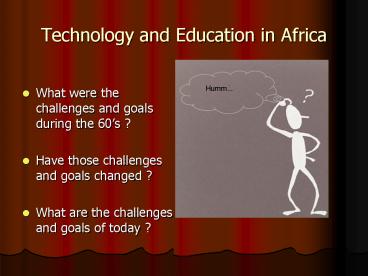Technology and Education in Africa - PowerPoint PPT Presentation
1 / 20
Title:
Technology and Education in Africa
Description:
Technology and Education in Africa. What were the challenges and goals during the ... This cannot be overvalue. This is absolutely priceless ! ... – PowerPoint PPT presentation
Number of Views:94
Avg rating:3.0/5.0
Title: Technology and Education in Africa
1
Technology and Education in Africa
- What were the challenges and goals during the
60s ? - Have those challenges and goals changed ?
- What are the challenges and goals of today ?
2
Are the challenges and goals of the early 60s
still the same ?Do we have new ones ?
- The main challenges and goals of the early 60s
- Make Education more accesssible to people and
primary school universal - Have african contents
- Education for development puposes
- The main new
- challenges and
- goals
- Achieve universal
- education and
- schooling
- Make sure poor people have access to education
- Be part of the Global Village
3
What were the obstacles in the 60s ?
- Not enough schools and classrooms
- Not enough teachers
- School curricula not adapted
4
Attempted solutions in the 60s
- Bridging the gap by using mass communication
technologies - Lack of teachers and school infrastructures
- Adapting the contents to cultural realities
5
Technologies used during the 60s
- Educational radio and active method for better
language skills The CLAD method in Senegal for
French - School television Côte dIvoire, Niger, Senegal
- Open air cinema, newspapers
6
Results of the 1960s experiments
- The contents were more related to everyday life
- Slightly better schooling rates
- Primary school students could speak French
- But
- Poor writing skills
- Expectations in secondary and higher education
not met
7
then computer science and LOGO Language came in
the 1980s
8
What were the challenges and goals of the 1980s ?
- Thanks to computer science and via computer (CAL
and CAI) - Make quality educational services more accessible
- Develop and improve the mental capacities for
problem solving - Modelise students and teachers behaviours using
expert systems
9
What experiments were carried out during the
1980s ?
- For more accessibility
- Computer material devolopment projects (LogaBax)
- For learning and teaching
- The LOGO Projects in Senegal with the MIT and
Pr. Seymour Papert team in Kenya with the Agha
Han Foundation
10
What are the results of the 1980s ?
- Just like the French Project Computers for all
- Main obstacles the lack of quality teaching
materials and teachers who were not open to
change (teachers misoneism) - Another obstacle difficulty to evaluate how
successful computer pratice and CAL/CIA were
11
The new challenges and goals since the 1990s
- Achieve universal schooling
- Guarantee lifelong education for all
- Overcome ignorance, famine and health problems
- Promote education for peace and understanding
12
Suggested solutions during the 1990s ?
- Develop public service education
- Support local initiative for promoting basic
education in community schoool and community
education system
13
Expected results during the 1990s ?
- Guarantee the quality of education
- Set up appropriate educational services
- Trying to be as efficient as possible
14
What are the main results of the 1990s ?
- Underpriviledged people like women have access to
education
15
more children and adults go to school
- Basic community education is everybody concern
school are open to all - Basic community schools accept children with no
formal education or school drop-outs - Adults have special literacy programmes
16
but several difficulties remainingno comment
17
Can poverty and ignorance be overcome if they are
hidden ?
18
The people and populations are better judges than
we are !
19
From our part, we must prepare the teachers for
their job
- Let us give them proper training
- Let us make them prepared to fulfil their mission
as facilitators for modern knowledge acquisition
20
In preparing for the future, we are bound to
innovate despite easy criticims !
- Let us take modern technology, science and
culture to more isolated and remote hamlets - Let us open the doors of modern science and
culture the tip of the iceberg of the human
genius- to todays youth which constitutes the
future for us all - This cannot be overvalue. This is absolutely
priceless !

